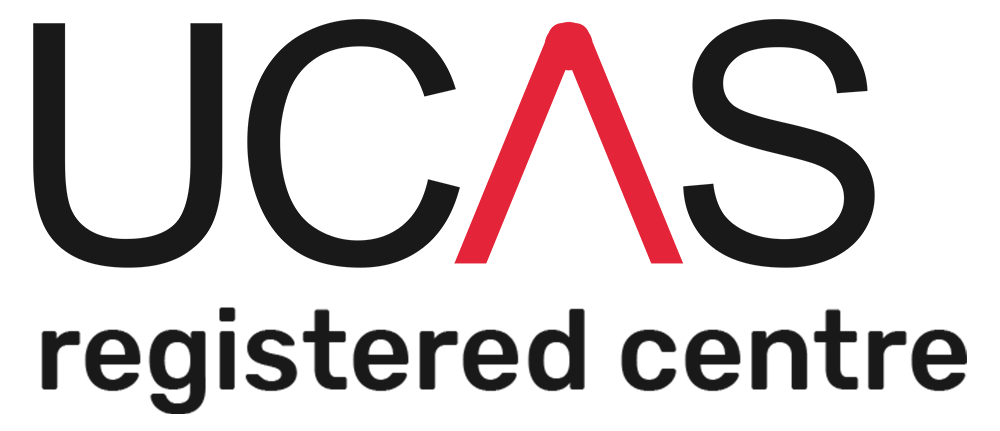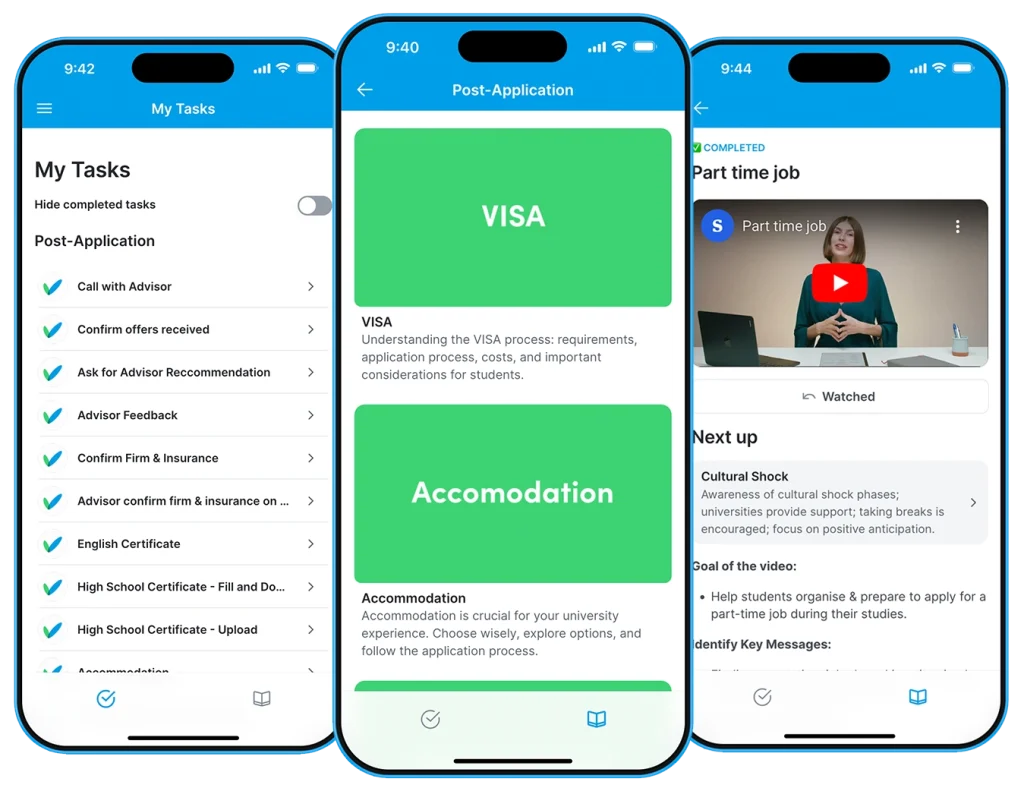You sent your application. What's next?
Studey partners with most universities in the UK to provide pre-enrolment support to every international student. The support is funded by UK Universities and it’s already included in you tuition fees.

Live your experience to the fullest, with a dedicated mentor ensuring you achieve the utmost through to your first year and beyond.
Included


Your advisor will be available to assist you throughout your whole first year, to support your goals and satisfaction at university.

You will receive free access to our Studey App, with free resources and a checklist of steps you need to complete to enrol successfully to Uni.

Mentor team

Tina is the co-founder of Studey, she is a former International student in the UK and has helped hundreds of International student. She has a Degree in Positive Psychology and a diploma in Education Coaching.

“Meeting ambitious students and discussing their academic and career aspirations makes me excited and motivates me professionally. Having been an international student in the UK myself, I am aware that making the first steps could be challenging as there are many important choices to make.”


Free for all International Students


Studey is part of the UK Agent Quality Framework



Included webinars








Register for Studey Post-Application

Complete the Registration form at the bottom of this page with your details matching your University application.


You will get access to our Studey App, where both you and your advisor will keep track of your pre-enrolment checklist, and to access the resources section with a wealth of useful tips and guides.

Monitor your pre-arrival checklist in the Studey App
- Pre-arrival checklist
- Resources
- Enrolment documentation Review

Frequently asked questions
University fees in the UK can vary significantly depending on the university and the course of study. Fees can range from about £15,000 to £38,000 per year, with specialist courses like medicine and MBA potentially costing even more.
Other Costs: In addition to tuition fees, students should also consider living costs, including accommodation, food, transport, books and other educational materials, and personal expenses. These costs can vary depending on the university’s location and the student’s lifestyle.
Grants and Scholarships: There are various funding options available for students, including loans, scholarships, and grants. These can help cover tuition fees and/or living costs.
Remember that these figures are approximate and subject to change. It’s always advisable to check directly with the universities for the most accurate and up-to-date information.
- Global Recognition: UK universities are globally renowned for their academic excellence, making their degrees highly respected and recognized worldwide.
- Intensive Programs: Focused and intensive three-year undergraduate courses allow for deep immersion in the field of study.
- Versatile Skills: Development of cross-disciplinary skills such as critical thinking, communication, and adaptability, which are sought after in the job market.
- Networking and Professional Links: Opportunities to create meaningful professional and academic networks.
- Cultural and Social Experience: A rich life experience in a multicultural setting.
- Employment and Internship Opportunities: Possibilities to gain practical experience through internships and work during studies.
- Cutting-Edge Research: Access to leading research and the chance to work with renowned experts.
- Customizable Education: A wide choice of courses and flexibility in customizing the study path.
Accessible and Collaborative Approach: Faculty members at English universities tend to be very accessible and encourage a collaborative approach. They are often available for discussions and feedback outside of lectures through office hours or via email.
Focus on Student Independence: While faculty provide guidance and support, there is a strong emphasis on student independence and self-management. This means students are encouraged to take initiative in their learning, asking questions and actively participating in class discussions.
Constructive Feedback: English faculty usually provide constructive feedback, both academically and personally, helping students develop their skills and better understand course material.
Mentorship and Professional Support: Many faculty members offer not just academic support but also professional advice and mentorship, especially in relation to careers and job opportunities post-graduation.
Stimulating and Inclusive Environment: Universities in England strive to create a stimulating and inclusive learning environment, where students and faculty from different backgrounds and perspectives can interact productively.
A City University is generally located within a city, often integrated with the surrounding urban environment. This means its facilities, such as departments, student residences, and services, may be spread across various locations within the city. Students at a City University often have the opportunity to fully immerse themselves in urban life, with easy access to the city’s restaurants, shops, culture, and nightlife. However, this can also mean that the university experience is less “centralized” and there might be less sense of a concentrated university community in one place.
On the other hand, a Campus University is often located in a specific area, with most or all of its buildings and facilities concentrated in one area. This creates a very strong sense of community, with students and staff living, working, and studying in a relatively closed and cohesive environment. Campus Universities can be located in both urban and rural settings, but the distinguishing feature is that they form a ‘world of their own’ that provides almost everything a student might need: accommodations, classrooms, labs, libraries, sports facilities, and social spaces. This can foster a strong university identity and a sense of belonging, but it might also mean less daily interaction with the city and the broader community outside the campus.
The placement year, also known as a work placement year or sandwich year, is a component of some degree courses in the UK that offers students the opportunity to gain practical work experience as part of their academic journey.
During this year, students work in a company or organization related to their field of study. This can occur in various sectors, such as business, engineering, health, education, or creative arts. The placement year usually takes place between the second and third year of study, or between the third and fourth year in longer duration courses.
The experience gained during the placement year is invaluable for the professional development of students. It offers them the opportunity to apply the theoretical knowledge learned in the classroom in a real work environment, develop practical skills, better understand the industry they intend to work in, and build a network of professional contacts.
Many placements are paid, providing students with an income during their year away from university. However, the level of remuneration can vary based on the sector and position.
From an academic standpoint, the placement year is assessed and monitored by the university. Students typically have to complete specific tasks or projects and may be required to write a report or a reflective diary on their experiences. This assessment contributes to their final degree.
Furthermore, the placement year can significantly enhance the employability of students after graduation, providing them with relevant work experience that is highly valued by employers.
The exchange year, also known as a study abroad year, is a program that allows university students to spend a part of their course of study at a partner university in another country. Here’s how it typically works:
Selection and Application: Students interested must usually apply for the exchange year through their department or the international office of their university. This may require the submission of documents such as grade transcripts, a motivation letter, and sometimes a language test, depending on the teaching language at the host university.
Partner Universities: Universities have agreements with partner institutions around the world. Students can choose from these partner universities, based on their area of study and personal interests.
Academic Credit: The exchange year is structured so that students can earn credits that will then be transferred and recognized in their original degree course. It is important for students to ensure that the courses taken abroad are compatible with their study plan.
Financial Support: Some students may benefit from scholarships or specific grants for studying abroad. Additionally, in some cases, students continue to pay tuition fees to their home institution, avoiding additional education costs at the host university.
Cultural and Linguistic Experience: Beyond academic learning, the exchange year offers immersion in a different culture, allowing students to develop language and adaptation skills, as well as a broader global understanding.
Practical Preparation: Students must prepare for practical aspects such as visa, accommodation, health insurance, and travel planning.

